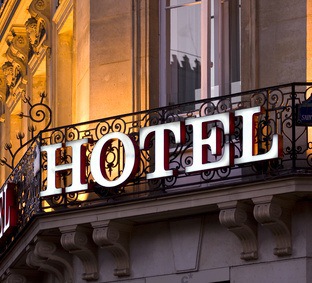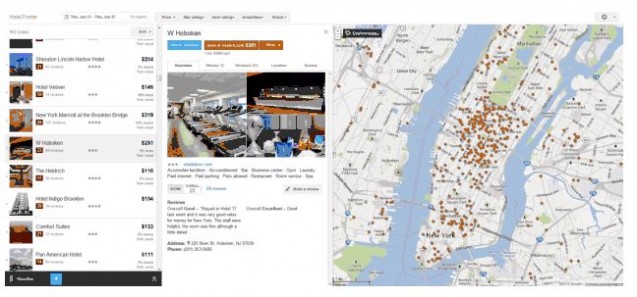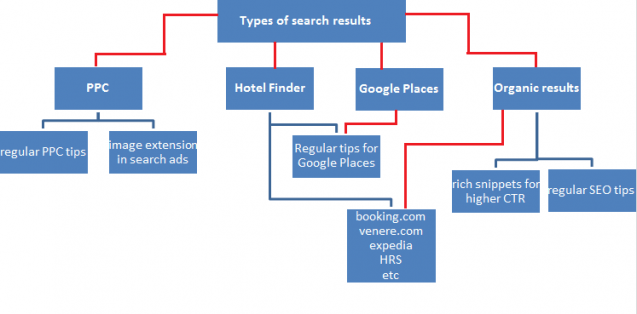Summer is a great time to speak about hotel SEO. As reported by the US Travel Association [http://www.ustravel.org/] last year, US residents alone took nearly 2 billion trips in paid accommodations. The majority of these people (if not all) searched for hotels online. That just goes to show that hotel SEO is very important.
In this post you’ll learn:
- what types of results you get when searching for hotels in Google
- how the results vary in and outside the US (as of June 2013)
- what Hotel Finder is all about
- how organic results for hotels queries are different and how to optimize for them
- an extra brand-new opportunity to stand out in PPC results
Types of Google results you get when searching for hotels
Since Google is now experimenting with their Local Listing Carousel [https://plus.google.com/+google/posts/KpsbyvHUotN], there are two completely different possible patterns for hotel-related queries when searching on desktop.
Hotel-related search results in the US
The major innovation here is that local results (that were previously listed within the main section) are now an attention-grabbing carousel at the top.
Image 1. The first page with results for a hotel-related query, as viewed by Google users in the US
Basically, if you type in a query like “new york hotels” in the US, then you’ll get the following types of search results:
1) Carousel of Local Listings at the top
2) PPC results (often with the recently introduced image ads) below the carousel and on the right
3) Hotel Finder results
4) Organic results
Hotel-related search results for the rest of the world
If you perform a similar search outside the US, you’ll get the following pattern:
(1) PPC results at the top and on the right
(2) Sponsored, or Hotel Finder results
(3) Local Listings
(4) Organic search results
Image 2. The first page with results for a hotel-related query, as viewed by Google users outside the US.
What’s Hotel Finder?
Hotel Finder is a service that was introduced by Google in 2011. The service finds accommodations for selected destinations and dates and then marks hotels on Google maps with detail.
Image 3. Hotel Finder details
As you can see, the technology behind Hotel Finder is quite complex and ensures abundant and detailed results. To provide such value, Google acquired Frommer last year [http://seekingalpha.com/article/815671-google-to-enhance-travel-searches-with-frommer-s-acquisition], a popular travel guide brand.
With Hotel Finder, users get a long list of hotel options on the left that come with pricing and rating details. They can choose locations on the map and the description of the corresponding hotel will pop up in the middle. For actual transactions, users are sent to booking and hotel review services (booking.com is a popular option).
Hotel Finder was first launched as a separate service and by late 2012, its results have been introduced into Google SERPs [http://blog.visrez.com/2012/11/google-integrate-hotel-finder-into-search-results/] (see images 1 and 2).
How to get to Hotel Finder results?
According to the corresponding Google Support page [https://support.google.com/hotelfinder/?hl=en], Hotel Finder uses multiple data sources to determine whether or not to display hotels in their service. While no single measure can guarantee inclusion, there are actions users can take to improve their presence here. These are the common steps recommended for Google Places optimization [https://www.searchenginejournal.com/how-to-promote-your-local-biz-using-social-local-and-mobile/43260/].
The actual booking process in Hotel Finder is supported through external services like booking.com, venere.com, HRS, agora and so on. Getting your website listed on these sites might be helpful for your inclusion into Hotel Finder.
What is special about organic Google results for hotel searches?
Tendency #1. Organic search results are being pushed to the second page by Hotel Finder and Google Places, especially for users outside the US.
Indeed, there are scarce organic search results for hotel-related keywords in Google when searching outside the US. Thus, getting there is tough. Luckily, it won’t last long because Google will be expanding the carousel feature for the rest of the world.
In some cases, SEO might turn out to be too expensive. Make sure you evaluate your costs and split your budget between SEO and PPC [http://www.ppchero.com/how-to-split-your-budget-between-seo-and-ppc-case-study/] wisely.
Tendency #2. Organic search results for hotel-related searches are dominated by catalog sites
If your query is general (“hotels london” vs “holiday inn london mayfair”), then you’ll find search results to be dominated by the review-type catalogs: booking.com, tripadvisor, venere.com, and expedia. Alongside with optimizing the site of your hotel, make sure you’re listed on the whole variety of review sites and that the information is relevant.
Tendency #3. Rich snippets are of paramount importance
We’ve already noted that the first page of hotel-related search results in Google is extremely diverse in search results types. It’s really tough to get into the few organic search slots available.
Rich snippets are crucial. You’ll want your CTR really high when your site makes it to the first page. For more information on to apply this, visit schema.org [http://schema.org/Hotel].
Using images in PPC adds
A couple of weeks ago, Google launched new image extensions for search ads [http://adwords.blogspot.ru/2013/06/new-image-extensions-enable-you-to-show.html] in beta. You can see an example in image 1 of this article. “Sometimes it’s easier to ‘show’ rather than ‘tell’ when promoting a business,” states Google AdWords announcement. It seems to be particularly true for hotel-related searches. With that in mind, I suggest exploring this opportunity.
Bottom line
To sum it up, here are the steps you need to take if you want to gain maximum online exposure for hotel-related queries:
1) Apply best SEO and PPC optimization practices that are universal for every niche.
2) Claim your listing at Google Places. Keep the information about your hotel full and updated. It’s crucial for both Hotel Finder and Google Places results. Track your ranking progress in Google Places with Rank Tracker [http://www.link-assistant.com/video.html#universal-search-tracking] or WebMeUp [http://webmeup.com/universal-search.html].
3) Try out image extensions in search ads (currently available in beta [https://services.google.com/fb/forms/imageextinterest/]).
4) Make a list of hotel booking and review sites: booking.com, venere.com, expedia, HRS, and etc. Add your hotel to as many of them as possible. This will increase your chances of showing up in both Hotel Finder and organic search results.
5) Apply schema.org markups for hotels. Organic search results for hotel-related keywords are scarce. If your hotel site makes the 1st page of search results, then you’ll get more Visits with rich snippets.
The diagram below summarizes steps you can take to optimize your business for hotel-related searches:
Image 4. Roadmap to optimizing sites for hotel-related searches.
What do you think works best when optimizing hotels for search engines? Do you have any practical experience you’d like to share? Your feedback is welcomed here in the comments below!
Image source: iStockphoto









![AI Overviews: We Reverse-Engineered Them So You Don't Have To [+ What You Need To Do Next]](https://www.searchenginejournal.com/wp-content/uploads/2025/04/sidebar1x-455.png)